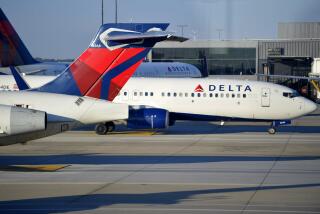Rethinking Airlines’ Child-Travel Policies
- Share via
Yes, America, you can lose a child in the air. Parents learned their lesson the hard way as America West lost track of four children in as many weeks. The airline has now changed its policy on kids traveling alone. Other airlines are reviewing their policies.
So are parents.
Although there are rules governing the transport and treatment of pets on airlines, there are no federal regulations that govern the treatment of children who travel alone. Each airline has different rules and methods of caring for unaccompanied minors (known as “U.M.s”). And “it’s a real turkey shoot as to how well or how closely a child is monitored” by any given airline, said Todd Curtis of Seattle’s AirSafe.com, a consumer watchdog group.
At LAX, Kenny Pouncey, a technical consultant waiting to catch his flight home to Houston, had heard about the lost kids, and it prompted him to action.
His daughter, Kenna, 8, now in Houston with her grandmother, will fly home to Los Angeles soon--alone. But now on a nonstop flight. “We were actually going to use America West until we started hearing about all this fun stuff. Now we’re going to use Continental, which is nonstop” to LAX to get her home to Long Beach and her mother, he says. When he heard about the lost child, Pouncey said, “I called my ex-wife and said, ‘We’re changing. I don’t want her to end up in Florida.”’
End up in Florida is exactly what happened to Aunnalise Woods, 11, who in mid-July was placed on an airplane in Los Angeles by her mother but put on the wrong connecting flight to Detroit by airline personnel. After an 18-hour trip that ended up routing her through Las Vegas as well as Florida, she finally reached her waiting dad in Detroit.
“You lose luggage. You lose keys. You don’t lose a child,” Aunnalise’s father, Bill McDaniel, told CNN.
Days later, Cody Sherill, age 10, went missing for five hours when his flight from Ohio--where he’d been visiting grandparents--was grounded due to equipment failure. The airline sent Cody to Phoenix before forwarding him home to San Diego, apparently without informing his family.
America West then announced that starting Sept. 10, it would only fly unaccompanied minors under 12 on nonstop flights, eliminating them from travel to any destination that required a change of plane.
Before the new policy could even kick in, the Spears sisters (Sierra, 8, and Krista, 11) were briefly lost last weekend. They left their father in Texas, deplaned in Phoenix to catch a connecting flight and were mistakenly sent to Ontario, Calif., instead of to San Diego, where their mother, Michelle, was waiting.
“I don’t understand how it happened,” the mother later told reporters.
Like the other parents whose children were lost, she had paid an extra $60 each way to the airline to ensure that her children would be escorted by an adult employee to the right connecting flights.
Peter Greenberg, chief correspondent for the Travel Channel and travel editor for NBC’s “Today Show,” says “the bottom line about kids on planes is this: Anytime you send an unaccompanied minor on an airline, the false presumption is that there is day care in the air.”
That’s not necessarily so, he says. “There is no FAA mandate that requires additional personnel to care for your unaccompanied child.”
Jim Sabourin, vice president of America West Airlines, which “lost” the four children, says that none of them were really lost. Each was in the good care of America West employees the entire time, he says, even though other employees and the children’s families could not always locate them.
His is not the only airline which has had such incidents, he said. Both Delta and Southwest recently had somewhat similar problems, he said. “But if it doesn’t make the news and become publicized, then it hasn’t happened, if you know what I mean.” The industry has an outstanding record transporting unaccompanied minors, he says, so people assume that nothing will happen or has happened.
Industry experts agree that even as airlines have become beset with problems--ranging from labor strife, cutbacks and customer dissatisfaction to increased flight cancellations and delays--the number of children traveling unaccompanied by adults has risen dramatically. The FAA does not track the number of these children, but estimates range as high as 7 million per year.
The number of divorces, with parents living in different states, and grandparents who live far from grandchildren they want to see, have contributed to a customer base of children who fly alone because their parents or guardians haven’t enough time and/or money to assure that a member of the family flies with them.
It’s amazing that children have fared so well so far, say many in the industry, who note that the Department of Transportation has no complaints on file regarding assaults, molestation or other criminal behavior toward minors who fly alone.
But the DOT has received complaints from parents that unaccompanied children are more frequently being bumped from reserved seats even though airline personnel are informed that adults are waiting to meet those children on the other end. And there have been complaints that children had no adult escort even though they paid an additional fee (from $30 to $75 each way) to make sure their children would be taken care of between flights.
Sabourin of America West says the “escorts” for whom parents have paid may be high school or college students or senior ex-employees who work part time on an hourly basis during summers and school holidays. In less busy times, a full-time employee may be assigned as the “runner” to make sure children make connecting flights.
The responsibility is not placed on any single employee’s shoulders, he says. There are “enough checks and balances in the system,” so that mistakes should not be made. “The runner brings the child to the gate attendant for departure on the connecting flight. The gate attendant is supposed to check the child’s ticket, to make sure he or she is getting on the right flight. Then the runner proceeds onto the plane and hands the child off to a flight attendant, who should look at the ticket as well. No way should any child get on the wrong plane under those conditions. That’s why this is so embarrassing to us,” Sabourin says.
Sabourin says the new policy about connecting flights is due to “a business decision. We transport at least 25,000 unaccompanied minors a year, and we are a small airline. There is potential for things to happen on connecting flights. The bulk of resources, cost, complexity, challenges and even liability is with connecting flights. We cannot create a flawless system for any amount of money--and our primary goal is remain a low-fare airline of quality.”
Leslie Mayo, representative of the American Airlines flight attendants union, says the airline “is addressing the issue right now” of unaccompanied minors, but would not elaborate.
Sabourin cautions parents not to take anything for granted. There are flight delays, bad weather or equipment problems that causes planes to return to a gate after parents think it has already left. It is not enough to pay a fee and assume there will be no glitches.
Meanwhile, the arrivals and departures of children--accompanied and unaccompanied--goes on.
Arriving at LAX from Washington, D.C., were three excited little boys, Alulla Workie, 11, and his brother, Yonathon, 10, and their cousin, Abel Ayele, 11. On hand to meet them were Alulla and Yonathon’s parents, Kefelegn Workie and Nigist Abebe of La Palma, and Abel’s father, Berhanu Ayele of Cypress.
Kefelegn Workie said, “I didn’t hear about (the lost child incident) until we were on our way coming here. I asked my wife, ‘Why are you telling me this now?”’ The boys, flying alone for the first time, had been visiting family friends in Virginia. When booking their passage, Workie said he had “made sure it was a direct flight.”
The kids themselves had heard about the lost child on the radio on their way to Dulles Airport but had shrugged it off. Said Abel, knowingly but not accurately, “The reason she got lost was the pilot.” As for his flight, he thought “it was fun. The service was great. They treated us good because we’re minors.”
Jennifer Schwandt, a Palmdale legal secretary, was on hand to meet daughters Stephanie, 11, and Samantha, 8, as an attendant escorted them off a Southwest Airlines flight, arriving late from the Northwest. The girls were not handed over to her until she’d shown her I.D. and signed for them.
They’d been visiting their grandparents in Idaho and Washington state, and this was their first time flying solo.
“Would I do it again? I don’t know,” said their mother, who hadn’t heard about the lost child. “It’s just scary. We made sure it was a flight with no changes. They’re usually a little more expensive, but it’s worth it.”
Pat O’Fallon of Pasadena was a little teary as she stood at the window, waiting for American Airlines flight 1004 to take off for Tulsa. On board were her grandchildren, Shawnee, 9, and Jake Waclawski, 10, flying alone.
“Their father is driving two hours to Tulsa (from the family’s home in Bella Vista, Ark.) so they could get a nonstop flight,” said O’Fallon. Her daughter, the children’s mother, died a year ago and O’Fallon retired from her job as a social worker to spend more time with her grandchildren. She hadn’t heard about the lost child--”Thank God.”
Amy Lisicka, 10, and brother Lenny, 6, of Inglewood were decidedly nonchalant, waiting to board an America West flight to Las Vegas. A family friend was traveling with them that far, but they would then fly alone to Dallas to see their grandparents.
Yes, they’d flown alone before--no big deal. No, they’d never been lost. Flashing a gap-toothed smile, Lenny reckoned that this flying gig is great. Amy giggled and said, “We go for free. My mom works here (as a passenger service representative).”
More to Read
Sign up for The Wild
We’ll help you find the best places to hike, bike and run, as well as the perfect silent spots for meditation and yoga.
You may occasionally receive promotional content from the Los Angeles Times.






